Project presentation
„Disabilities beyond limits“
Nr. proiect: 2022-1-RO01-KA220-YOU-000087024
People with disabilities are most likely to report discrimination in areas such as employment, education and training, internet use and discrimination in interpersonal relationships and unfair treatment in general. What is also evident is that the younger cohort of people feel more discriminated against during first social contact and are most likely to report a disability barrier. Young people feel perceived discrimination more than any other age group.
Among young people with disabilities, women and girls face multidimensional exclusion, being not only subject to stereotypes in society, but also social injustice in everyday life. Younger women continue to face triple discrimination because of their gender, age and disability.
These are the reasons why our project focuses on inclusion and diversity, participation, civic engagement – there is an urgent need to increase the quality of youth work, to improve different types of skills related to supportive contexts for young women with disabilities (YWwD), gender promotion. equality, strengthen capacities to connect these women to communities, including the use of digital tools for this underrepresented group.
Purpose: To support increasing the capacity of partner organizations to create inclusive environments based on improvements and new approaches that empower young women with disabilities for civic engagement, participation and community contribution to manifest their full potential.
OBJECTIVES:- O1. To increase the quality of practitioners' work with digital tools and practices that support YWwD as active partners in their own inclusion and participation through at least 2 innovative products (methodological and pedagogical), in 3 countries/European level throughout the project.O2. Improving the applicative and inclusive nature of learning environments for potential YWwD personnel through an interactive method (scenario) stimulating 2 transferable skills (leadership and community problem solving) in 3 countries/European level in at least 10 months of the project.
- O3 Increasing awareness of the project and the ability to use and exploit its inclusive results in the 4 partner organizations/their external environment during the implementation period in 3 partner countries/European level.
- Methodology of Support Circles for Inclusion for practitioners with 2 parts: one focused on the implementation of face-to-face sessions; others, on virtual sessions that include best practices and tools for online facilitation.
- The virtual portfolio with 2 applied training modules: Leadership and Community Problem Solving.
- DISABILITIES Civic LAB: online compendium of 12 scenarios created even by YWwD with practitioners practicing those transferable skills/leadership & problem solving + practical guides for practitioners.
- 1 transnational training program: ”Building Scenarios”; 3 national sessions (ToT) to transfer know-how to other experts working together with YWwD on various scenarios for more applicative & inclusive contexts; 9 national workshops with YWwD to build scenarios.
STRATEGIC OUTCOME: A strong partnership that promotes inclusion and diversity as the most relevant pillar among practitioners to increase the capacity of YWwD and empower them to lead healthy, engaged and productive lives in their communities – Beyond limits! These are seeds for a better future both for the young women and their families and for the community as a whole.
Project period - 18 months (01.10.2022-31.03.2024).
The Consortium consists of:- Federation for Accessibility of Romania as main partner, (FAR Romania)
- Association of Consultants and Experts in Social Economy Romania, (ACE-ES Romania)
- National Confederation of Disabled Persons, (NCDP Greece)
- Centro Superior de Formación Europa Sur, (CESUR Spain)
Partners
FAR Federation for the Accessibility of Romania
Romanian society is made up of individuals and groups within the framework of interaction and social relations, as a result of individual and group actions and behaviors.
FAR was born out of a desire to promote and monitor access and accessibility!
The social action of FAR is a fundamental component of the activity and consists of an integrated set of distinct activities, in order to obtain a concrete result in the monitoring of access and accessibility (Art. 9 of the UN Convention on the Rights of Persons with Disabilities), with the aim radiography of a very important component of the social system, the person with functional impairment, the disabled person.
NCPD National Confederation of Disabled Persons
The National Confederation of Persons with Disabilities is the level 3 socio-confederate agency of the country's disability movement.
It was founded in 1989 by organizations of disabled people and their families in order to defend issues of common interest to all categories of disabilities and to be an independent and powerful agency representing disabled people and their families in the Greek state and in society. At the national level, the Confederation fights for the protection and advocacy of the human and social rights of people with disabilities, to reduce social bias and to combat the discrimination they experience.
Its purpose is to equalize the opportunities of disabled people in all sectors of their lives and to ensure dignified living conditions and full incorporation into society.
The confederation establishes an action plan, exercises a systematic control of regulations and legislative provisions and presents proposals to the Greek state regarding issues such as: education, vocational training, employment, information society, universal access. At the European level, the Confederation recognized the need for active participation in a truly representative European disability organization, such as the European Disability Forum, which represents disabled people in dialogue with the European Union to the European Commission, the European Parliament, the Council of the European Union and other authorities European. With the aim of developing a European political framework for disability, focused on equal opportunities and combating discrimination, it participates in an extensive network of contacts with the National Council of Persons with Disabilities of the other member states, as well as of the states in the process of joining the European Union.
ACE-ES ROMANIA Association of Consultants and Experts in Social Economy Romania
Association of Consultants and Experts in Social Economy Romania (ACE-ES) is an association founded in Romania in 2011 that aims to support and promote social economy (social entrepreneurship) seen as a viable tool for innovation and flexibility within the economic and social environment, for sustainable development and active citizenship, for cooperation, solidarity and social inclusion.
Main Activities:- Supports and promotes or, as appropriate, organizes continuous training activities;
- Carries out/organizes research-action, studies, analyses, interventions and pilot projects, seminars, conferences, working groups;
- Support and promote or, as appropriate, organize innovative, interregional, national and transnational activities;
- Acts, in a variety of ways and methods, to support disadvantaged communities / groups, for full access to social, educational, active employment and integration services and programs;
- Promotes entrepreneurial culture, innovation, research and the development of a knowledge-based society.
The members of the association are very active in developing innovative instruments of social economy – a social brand of inclusion, training on social entrepreneurship, professional standards pertaining to the domain’s jobs etc.
CESUR Center for Superior Training Europe South
Centru Superior de Formare Europa Sur (Cesur) was born from Grupo Coremsa, a business group specialized in, among other things, higher education and vocational training.
Higher education has been a priority for Grupo Coremsa for many years; we have a strong commitment to provide our students with the most advanced and functional technological equipment as well as qualified and professional teachers.
Cesur counts 11 higher education centers: Madrid, Malaga (City Center), Malaga PTA (Andalusia Technology Park), Malaga CTM (Transport Center), Las Palmas de Gran Canaria, Santa Cruz de Tenerife, Seville, Murcia and Badajoz .
Among the offers of these centers are more than seventy official cycles of higher education, either at the individual level or online, approved by the respective ministries of education in each region.
Work packages
WP 1 - Project Management
WP 2 - Quality work products and tools for practitioners
- Inclusion support circles methodology - practical methodology Download the methodology
- Community Problem Solving Portofoliu digital
WP 3 - Training activities and applied learning contexts
- DisABILITIES Civic LAB - Practical guidelines for practitioners English | Romanian | Greek | Spanish
WP 4 - Sharing the results
News and events
Building scenarios training
Building scenarios training
- Agenda -
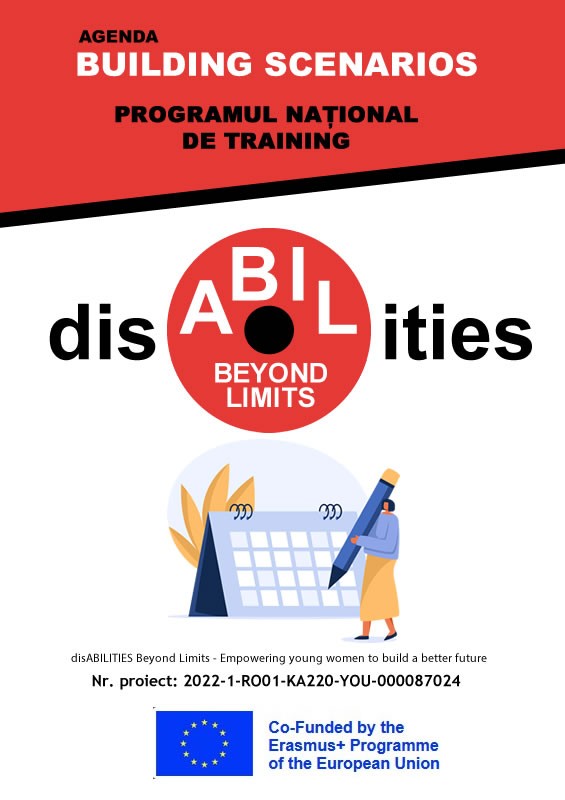
NATIONAL TRAINING PROGRAM ”BUILDING SCENARIOS”
19.09.2023, BUCHAREST
The overall objective of the training session: To develop knowledge and skills related to the method of building scenarios in order to create an applicative and inclusive learning environment through which this process can be simulated using thinking; creative thinking and imagination in order to identify possible solutions to the problems faced by young women with disabilities in their communities.
General objective of the training session: To develop knowledge and skills related to the method of scenario building to create an applied and inclusive learning environment through which this process can be simulated using creative thinking and imagination in order to identify possible solutions to the problems faced by young women with disabilities in their communities.
10.00 – 10.45
Opening of the National Training Program “Building Scenarios”. Presentation of program goals and objectives. Brief presentation of participants and facilitators.
10.45 – 11.20
Introduction to the topic of the training program. Initial Reflection Exercise (IRE).
11.20 – 11.40
Break
11.40– 13.20
Presentation on the topic of concepts and approaches used in the method of building scenarios, using as a foundation the process of solving problems in the community. Exercise / task for applying the scenario method.
13.20 – 13.40
Break
13.40 – 15.00
Plenary presentations of the results of the work task. Analysis and debates.
Initial Reflection Exercise (IRE). Completing the evaluation questionnaire of the training program. Conclusions and the end of the training program
Inclusion support circles methodology
Inclusion support circles methodology
- Practical methodology -
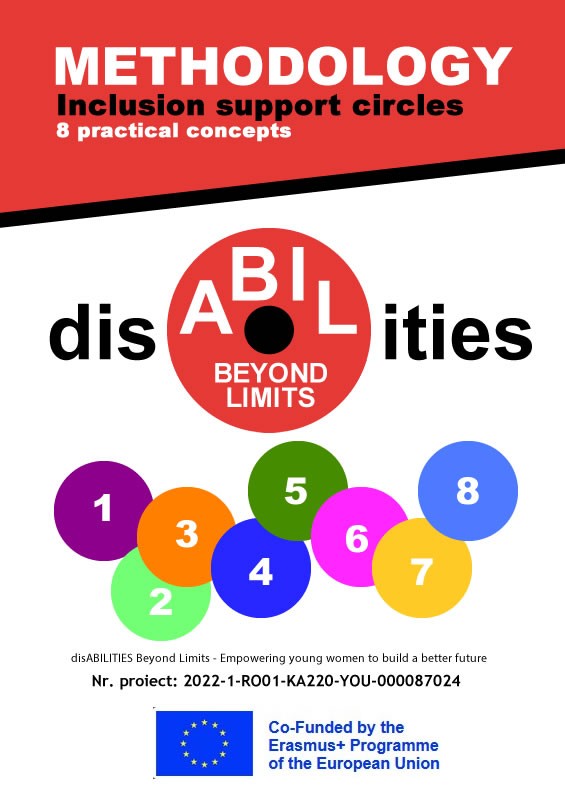
A new methodology aims to provide practical tools to support young women with disabilities (YWwD) through inclusion support circles. Developed through a collaborative project, the methodology offers both in-person and online resources to empower YWwD and help them navigate daily challenges.
The main goal is to boost self-confidence and support the talents and abilities of YWwD. The methodology focuses on building positive relationships, sharing experiences, and fostering a sense of community. It aims to provide a safe space for open and honest discussions about relevant topics.
The methodology outlines 8 core concepts to guide inclusion support circles:
1 "I, Unique and Valuable" - Building self-worth
2 "My rights, your rights - Communication and tolerance" - Fostering mutual understanding
3 "Dialogue & participation in decisions, without barriers!" - Promoting inclusion
4 "Me and community! My involvement, my civic contribution" - Encouraging community engagement
5 "Lifestyle, health, exercise and food" - Developing healthy habits
6 "Waste and environmental protection" - Raising awareness
7 "Different but together - diversity, inclusion, cohesion" - Embracing differences
8 "Creative and Digital!" - Exploring talents
The methodology provides specific guidelines, steps, and tools to create both in-person and online support circles. It emphasizes accessibility, active participation, tailored activities, open communication, and community building.
By bringing YWwD together to share their experiences in a supportive environment, the methodology aims to build confidence, skills, and networks. It offers a collaborative approach centered on meeting the needs and goals of each individual YWwD.
The practical tools and peer-to-peer format have the potential to create transformative change in the lives of YWwD. As the methodology is implemented, it will continue to evolve to best serve this community.
Community Problem Solving
Community Problem Solving
- Piloting session -
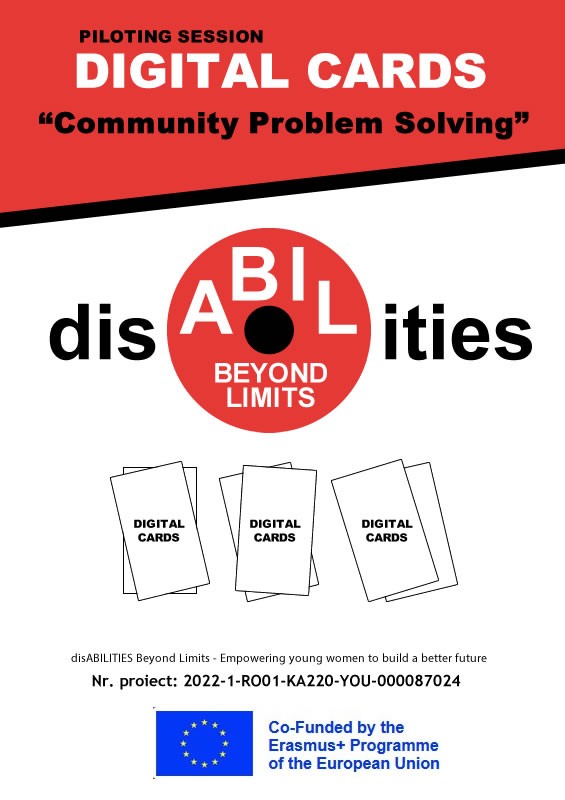
On 11.07.2023, ACE-ES Romania together with the Federation for Accessibility of Romania (FAR), organizes the pilot session of a set of 16 cards (each card contains a method of solving problems in the community) within the ERASMUS+ project "disABILITIES Beyond Limits - Empowering young women to build a better future".
The pilot session aims to analyze, test and validate the cards, in order to allow its improvements.
At the pilot, experts are invited, who work with young women with disabilities, as well as young women with disabilities, to provide feed back and suggestions.
The cards can be accessed here:
Transnational training program: Building scenarios
Transnational training program: Building scenarios
- Training -
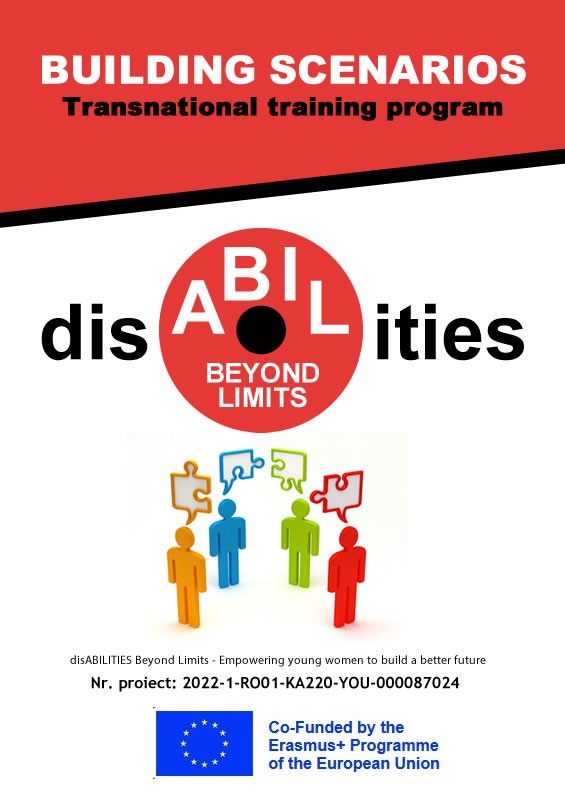
Within the transnational project ERASMUS+: "disABILITIES Beyond Limits - Empowering young women to build a better future", between June 20-22, 2023, is organized in Athens, Greece, by the partner NCDP (National Confederation of Disabled People), the transnational program of "Building Scenarios" training.
The main objective: providing skills and practical knowledge related to the scenario method, encouraging participants to use this method as a key element in creating applicative and inclusive contexts in working with young women with disabilities.
Inclusion Support Circles Methodology
Inclusion Support Circles Methodology
- Piloting session -
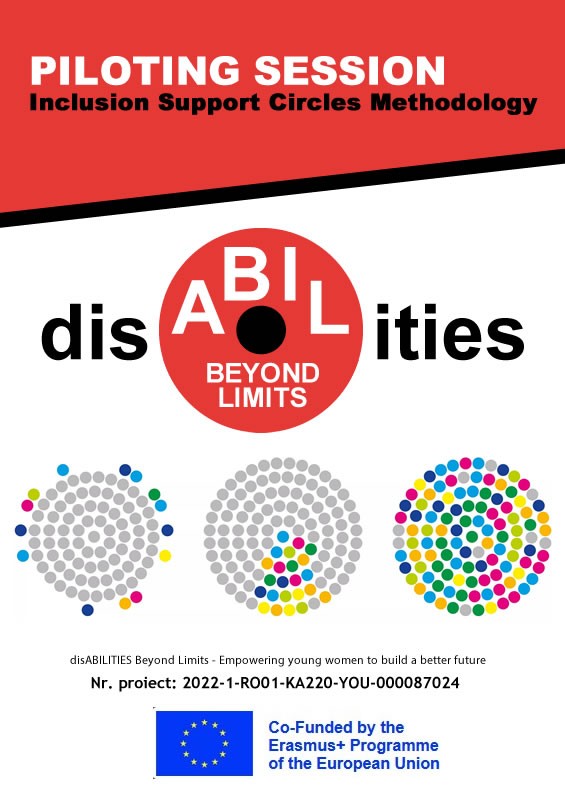
On 13.06.2023, the Federation for the Accessibility of Romania (FAR), together with ACE-ES Romania, organizes the pilot session of the "Support Circles for Inclusion" Methodology, within the ERASMUS+ "disABILITIES Beyond Limits - Empowering" project young women to build a better future”.
The pilot session aims to analyze, test and validate the sections of the methodology, in order to allow its improvements.
Experts, who work with young women with disabilities, are invited to the pilot, such as and young women with disabilities, to provide feed back and suggestions.
The methodology is a working tool, which focuses on the way, in which a circle of support for the inclusion of young women with disabilities could be developed and implemented, together with these young women, so that they build their self-confidence, skills, talents and optimal relationships with other young women and with the community.
Virtual portfolio with two training modules
Virtual portfolio with two training modules
- Product 2 -
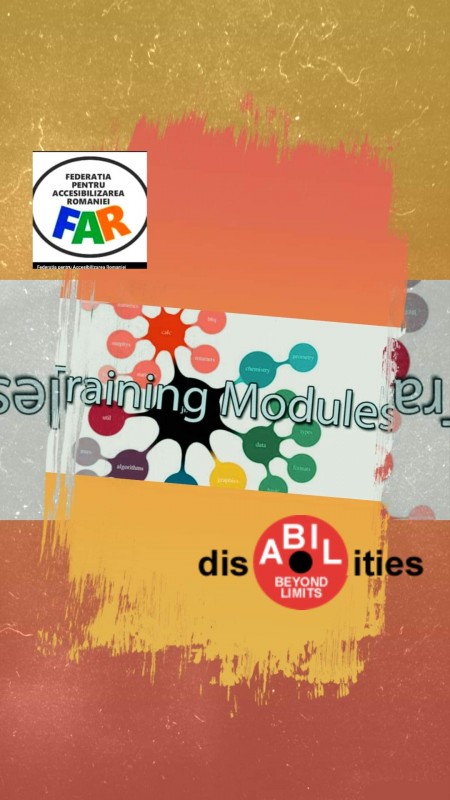
The Consortium working on the Enhancing the Personal and Professional Lives of Young Women with Disabilities (YWwD) project is proud to announce the development of Product 2, a virtual portfolio with two training modules. The portfolio aims to prepare practitioners to support YWwD in taking leadership and overcoming the limits imposed by stereotypes and stigma by developing transversal skills around civic engagement and participation. With such skills YWwD can contribute to their community and solve problems.
The first module, 'Leadership', and the second module, 'Community Problem Solving', include lesson plans, activity plans, teaching and learning resources, worksheets and forms, teaching and learning practices, games and dynamics. Each module has a built-in learning log to help YWwD track their progress. The portfolio also includes a set of 16 digital cards, each presenting a problem-solving method based on the ABLE (Analyze, Brainstorm, Lead, Execute) technique.
The development of product 2 went through several phases, including establishing a logical structure for each part, gathering information from relevant sources, brainstorming and internal consultation between partners. The first working version of the portfolio and set of 16 digital cards will be tested and revised to ensure it is practical and effective.
Piloting and validation of the set of 16 digital cards will involve one online session per country with six participants per country who are experts working with youth and YWwD. National reports and a transnational final report will be prepared to support the final review and improve the card set.
The consortium is excited about the potential impact of Product 2 and looks forward to making it widely available through the project website. The virtual portfolio is an important step towards creating a green, inclusive community for all.
Minutes of the technical meeting in Malaga
Minutes of the technical meeting in Malaga
- Minutes -
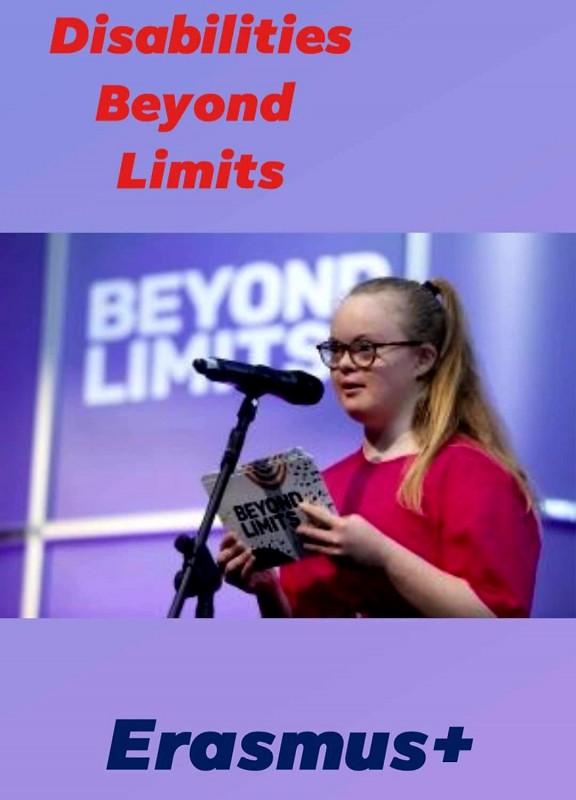
The technical meeting in Malaga took place on January 30 and 31, with all participants present. The purpose of the meeting was to discuss the first draft of the methodology and section, focusing on developing a unified approach and keeping the methodology practical and straightforward.
The partners agreed on 8 topics and confirmed the validity of the template, committing to keep the program on target for Product 2. They also agreed to pilot the methodology in April and discussed the need to cross-reference Section 2 to do so . stronger.
The partners considered different formats for the methodology, such as PDF, booklet and adding graphics, and agreed that the key principles should be well structured, with visual assets and learning from others to increase collaboration.
The introductory part of the methodology will be about one page long, starting with background and links to practitioner needs. It will be visually appealing and simple. Section 4 will focus on practical tools and the partners have agreed to keep a maximum of 3 tools for the discussion round.
The partners agreed that people with disabilities should play the main role in the methodology, and the aim is to improve their personal and professional lives, community involvement and self-confidence.
Piloting will be practical within our specific topics and each partner will pilot their own topics. The guidelines will be developed using the smart model and each partner will have a report after the pilot.
The partners also agreed on the slogan, "an inclusive green community for all", to be used in every text or post, broadcast and internal document.
Finally, the partners discussed the monitoring and evaluation exercise, mapping the main results and branches of the secondary results. A press release will be made about the meeting to disseminate the results of the discussion.
Overall, the Malaga Technical Meeting succeeded in establishing clear objectives and strategies for the development of the methodology, focusing on practicality, collaboration and improving the lives of people with disabilities.
A green inclusive community for all
A green inclusive community for all
- Information -
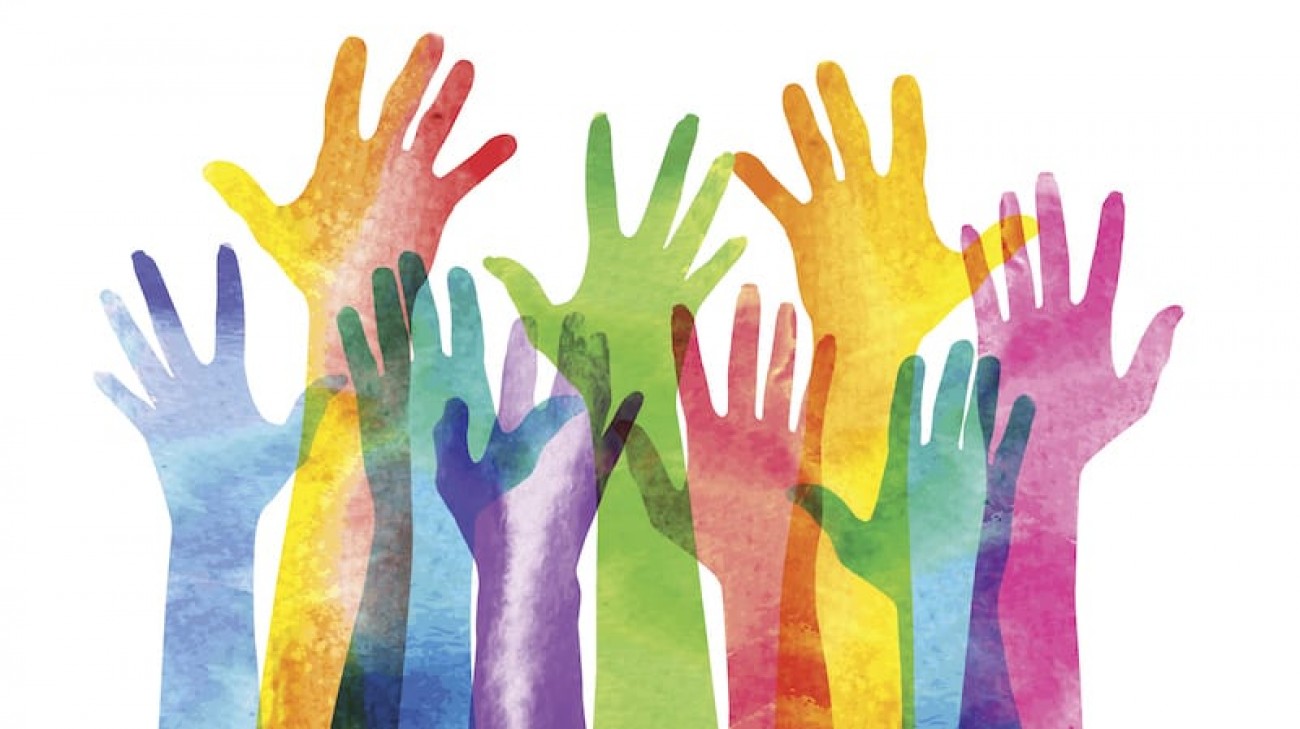
”An inclusive green community for all” is the slogan chosen by the partners of the ”Erasmus+ DISABILITIES Beyond Limits - Empowering young women to build a better future”, project co-financed by the European Union, within Action KA2, whose beneficiary is the Federation for Accessibility of Romania, in partnership with ACE-ES Romania, CESUR Formacion Spain and NCDP Greece.< /p>
”An inclusive green community for all” is a slogan for a project focused on environmental protection and inclusion young women with disabilities.
The tagline emphasizes the goal of creating a community that is both environmentally responsible and inclusive for all individuals, including those with disabilities. The slogan conveys a message of unity and common purpose and emphasizes the importance of making environmental protection accessible and inclusive for everyone.
This slogan also emphasizes the need to promote a conscious behavior of working îtogether as a community to create positive change.
Here are some answers for removing barriers from young women with disabilities in support circles:
Accessibility: We need to ensure that all physical, communication and technology-based barriers are removed so that everyone can fully participate in the circle of support. This includes providing accessibility features such as ramps, audio and visual aids and alternative methods of communication.
Awareness training: We need to provide training and education for participants and facilitators on awareness of the inclusion of young women with disabilities. This helps to promote understanding and empathy for people with disabilities and to remove barriers of ignorance and prejudice.
Flexible Scheduling: We will have to offer scheduling options flexible to accommodate the needs and schedules of all participants, including those with disabilities. This helps remove barriers to participation caused by time constraints or transportation issues.
Collaboration and Partnership: We will work with local organizations and community groups that serve young women with disabilities to identify and remove barriers to participation. This may include partnering with organizations to provide transportation or other support services.
Inclusive Communication: We encourage the use of inclusive communication and language and provide interpretation and translation services as needed. This helps remove barriers to communication and ensure that all participants participate fully in the discussions.
Support Services: We will monitor îpersonal care or mobility assistance to ensure that all participants can be present at the circle of support. This helps remove barriers caused by physical limitations or other support needs.
Definition of the circle of support for young women with disabilities
Definition of the circle of support for young women with disabilities
- Product 1 -
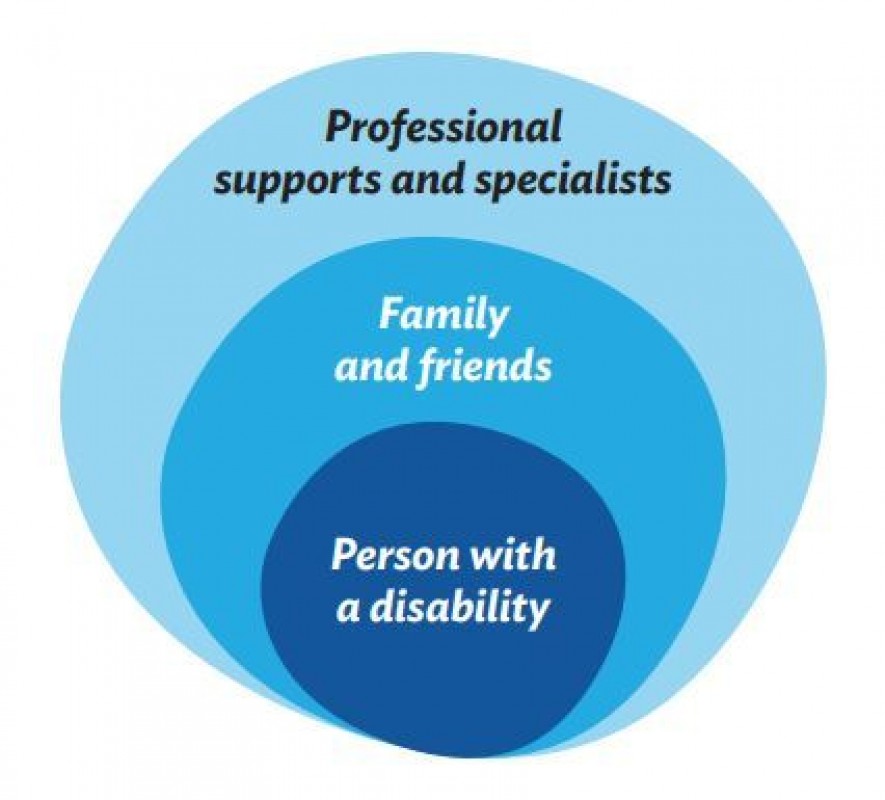
The first intellectual product developed by the consortium formed by the Federation for Accessibility of Romania, ACE-ES ROMANIA, CESUR FORMACION-SPAIN and NCDP-GRECIA, within the Erasmus + Disabilities beyond limits project
Definition of Support Circle for Inclusion for Young Women with Disabilities – What is an Inclusion Support Circle and who is part of an Inclusion Support Circle
Circles of support are an informal way of providing emotional and practical support to people with disabilities by connecting them with a network of supportive people.
These are often created by disabled people themselves or other disability activists and organizations and act as a way of giving disabled people access to a support network from their peers. Support circles are usually organized around specific themes, such as physical health, mental health, social activities or employment.
Members of the circle of support will meet regularly to discuss their shared experiences, share advice and offer emotional and practical support to each other. Support circles also often organize events and activities that are accessible to all circle members.
The aim of the circle of support is to create a safe space where people with disabilities can come together to share their experiences, offer each other emotional and practical support and access resources and advice that I can help them navigate life with disabilities. We want to create an atmosphere of understanding and acceptance where everyone can feel comfortable talking openly about their needs and challenges. We want to empower each other to live our best lives and give each other the support we need to do so.
Who is part of an inclusion support circle?
An inclusion support circle usually consists of people with disabilities, family members, carers and allies. Îin addition, there may be members of the community and representatives of local organizations who are involved in the circle of support.
The aim of the Inclusion Support Circle is to create a safe and inclusive environment where everyone can share their experiences, support each other and access resources and advice that can help navigate life with a disability.
What do the new circles of support for PWD bring to the world?
PWD Support Circles bring a sense of community, understanding and acceptance to the world. They provide a safe space for people with disabilities to share their struggles and successes, access resources and advice, and connect with peers who can relate and support them. Through these circles, people with disabilities can access the emotional and practical support they need to navigate life with a disability.
Îin addition, these circles can help raise awareness of disability issues and support the rights of people with disabilities. Îultimately, by creating an inclusive and responsible space, support circles for people with disabilities can help create a fairer and more just world for everyone.
How can a disabled person objectively evaluate discrimination?
A person with disabilities can objectively evaluate discrimination, paying attention to how he is treated compared to others. Are they treated differently than someone without a disability? Are they excluded from activities or opportunities that are available to others? Are they denied access to resources, services or accommodation? Do they face additional barriers in their daily lives that other people don't have to face? Paying attention to these patterns of discrimination can help a person with a disability assess the level of discrimination they are experiencing.
Îin addition, it may be helpful to look for resources or organizations that can provide additional information about disability rights and discrimination.
Is a young woman with a double disability discriminated against?
Young women with disabilities are often doubly discriminated against, as they face both gender discrimination and disability. This can limit their access to resources, services and opportunities and lead to marginalization and exclusion. In addition, young women with disabilities may face additional barriers due to social stigma, lack of access to health care and adequate accommodation, and the intersection of gender and disability discrimination. It is important to recognize these intersecting forms of discrimination and work to create a more inclusive and equitable society for young women with disabilities.
Transnational meeting regarding the development and validation of the Circles of Support Methodology
Transnational meeting regarding the development and validation of the Circles of Support Methodology
- Transnational meeting -
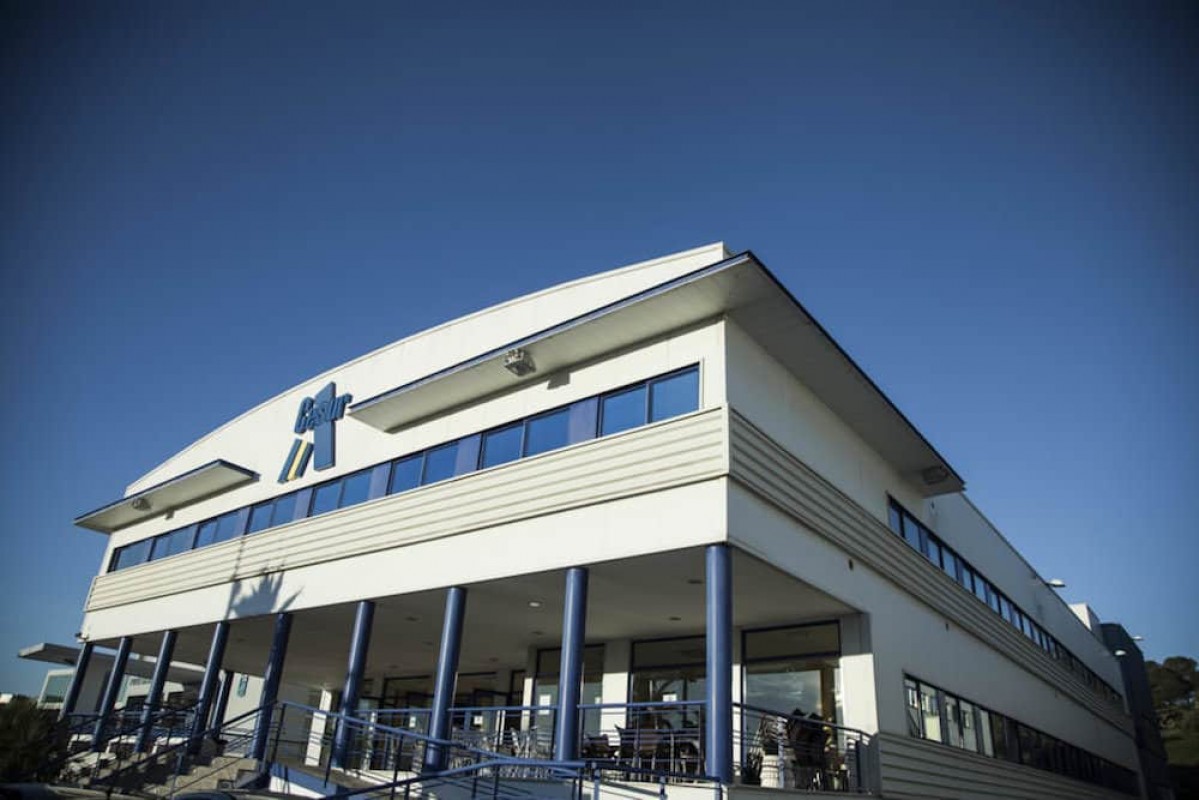
Transnational meeting on the development and validation of the Support Circles for Inclusion Methodology
Malaga, 30-31.01.2023
Day 1/30.01.2023
09:00 – 09:30: Introduction
Presentation from partners and meeting participants
The main objectives of the transnational meeting - CESUR
09:30 – 11:00: Presentation of the structure of the methodology – main content items according to product work plan 1 – CESUR
Discussion of first draft methodology as follows:
Introductory part (CESUR)
Defining Circle of Support for Inclusion with YWwD – What is an inclusion support circle and who is in an inclusion support circle (CESUR+FAR)
Key principles of support circles for inclusion (ACE-ES Romania)
How to deliver face-to-face Inclusion Support Circles (guidelines, steps, practical tools and tips for facilitators) (CESUR)
How to Deliver Online Inclusion Circles of Support (Guidelines, Steps, Practical Tools and Tips for Facilitators) (FAR+NCDP)
11:30 – 13:00: Development of a unitary approach for the respective section specific to the Methodology with practical concepts of circles of inclusion on 8 topics (two topics for each partner) – ALL PARTNERS
Day 2/31.01.2023
09:00 – 09:30: Review of Day 1 (CESUR)
9:30 – 10:30: Piloting/Validation of the Support Circles Methodology for Inclusion
Discussion and agreement on pilot framework and guidelines (CESUR+ALL PARTNERS)
10:30-11:00: Coffee break
11:00-11:30: Întâlnire M&E (ALL PARTNERS):
Technique “Mapping Results”.
EQ&SET applied at end of session (instruments are loaded in GD)
11:30-12:00 – Next steps; conclusions; Certificates of attendance for all meeting participants (CESUR)
Agenda of the first transnational meeting
Agenda of the first transnational meeting
- Agenda -
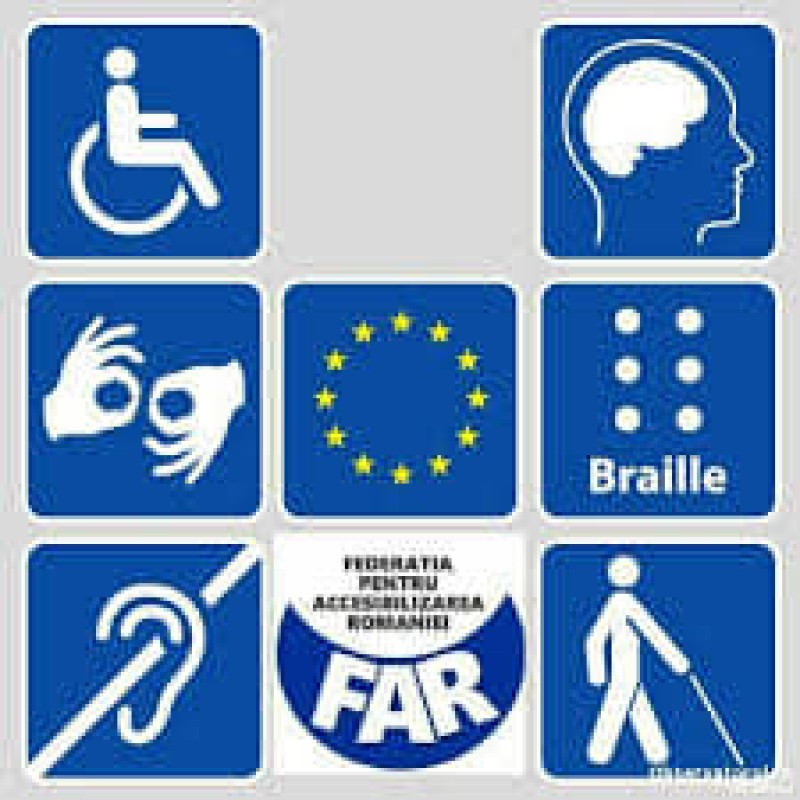
DISABILITIES beyond limits
3.11.2022 – 11.00 – 13.00 (Romanian time)
AGENDA
Presentation of project partners (FAR, ACE-ES Romania, CESUR, NCDP)
Presentation "DISABILITIES Beyond Limits!" - project objectives and work plan, logical framework (FAR)
Monitoring and evaluation plan (ACE ES Romania)
Dissemination Plan (NCDP)
The exploitation plan (CESUR)
WP2 Discussions
Information about project financing (budget)
Specific discussions on work planning until the second meeting (WP2-4)
Review of meeting agreements
PRESENTATION "DISABILITIES Beyond Limits!" - OBJECTIVES & WORK PLAN OF THE PROJECT
It's a good start, the project is very interesting and tackles a new and challenging topic. We will work together with professionals, who will give real value to the project.
Through the work packages that will be carried out in the project, we contribute to the valorization of young women with disabilities, this being a vector for the development of transversal YWwD skills, skills that support inclusion and involvement and decision-making in their own hands. . The priority is YWwD access and accessibility to all work packages throughout the project.
Project launch - disABILITIES Beyond Limits
Project launch - disABILITIES Beyond Limits
- Press release -
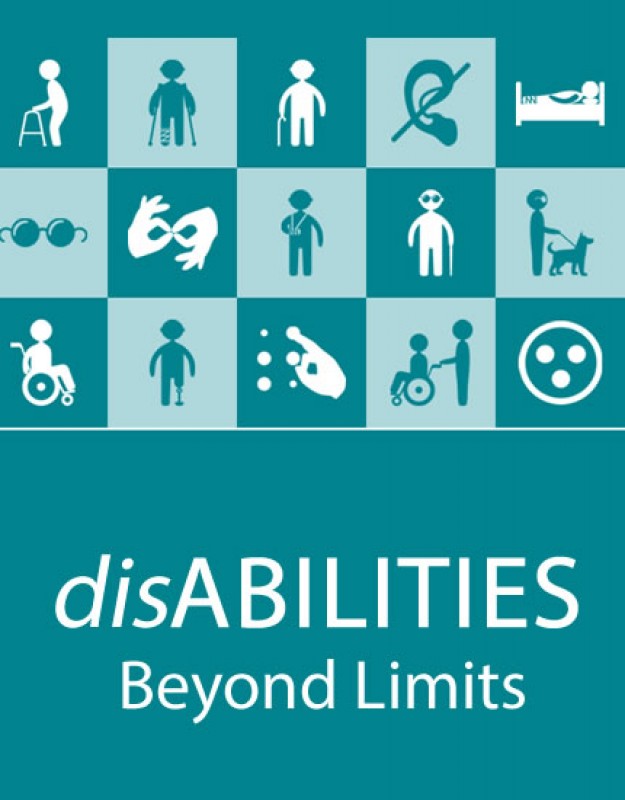
Erasmus+ - KA220-YOU - Cooperation partnerships in youth
"disABILITIES Beyond Limits - Empowering young women to build a better future" is a transnational project coordinated by the Federation for Accessibility of Romania (FAR).
This project is implemented in partnership with three other organizations:
- Association of Consultants and Experts in Social Economy Romania (ACE-ES Romania);
- CENTRO SUPERIOR DE FORMACION EUROPA SUR – Spain.
- National Confederation of Persons with Disabilities (NCDP) - Greece
The project started on October 1, 2022, has a duration of 18 months and is developed with the support of the European Commission, through the Erasmus+ program, KA220-YOU - Strategic Partnerships for Youth.
Overall Objective: To support increased capacity of partner organizations to create inclusive environments based on improvements and new approaches that empower young women with disabilities for civic engagement, participation and community contribution to manifest their full potential.
The main results of the project are:
STRATEGIC OUTCOME: A strong partnership that promotes inclusion and diversity as the most relevant pillar among practitioners to increase the capacity of YWwD and empower them to lead healthy, engaged and productive lives in their communities -
Beyond limits! These are seeds for a better future both for the young women and their families and for the community as a whole.
TANGIBLE RESULTS:
A)
a) Inclusion Support Circles methodology for practitioners with two parts: one focused on face-to-face sessions; others on virtual sessions that include best practices and tools for online facilitation.
b) a virtual portfolio with 2 applied training modules: Leadership&Community and Problem Solving.
c) DISABILITIES Civic LAB: online compendium of 12 scenarios created by young women with disabilities themselves, together with practitioners, by practicing those transferable skills/leadership and problem solving.
B) 1 transnational training program: "Building Scenarios"+3 national sessions (ToT) to transfer know-how to other experts working together with YWwD on various scenarios for more applicative and inclusive contexts.
The result of the entire project is the formation of a solid partnership that promotes inclusion and diversity as the most relevant pillar among practitioners to increase the capacity of young women with disabilities for a healthy, engaged and productive life in their communities -Beyond Limits! These are seeds for a better future both for the young women and their families and for the community as a whole.
Contact details
Useful links
Contact information
- E-mail: office@far.ngo
- Contact: form
- Adresa: Strada General H. M. Berthelot nr. 46, București 030167